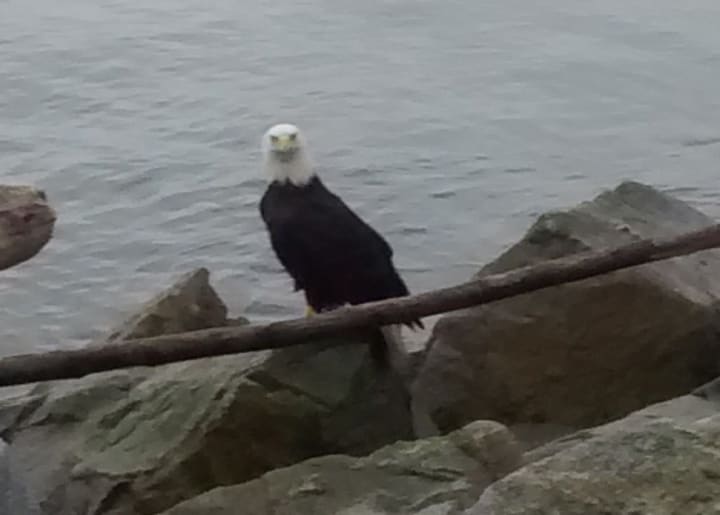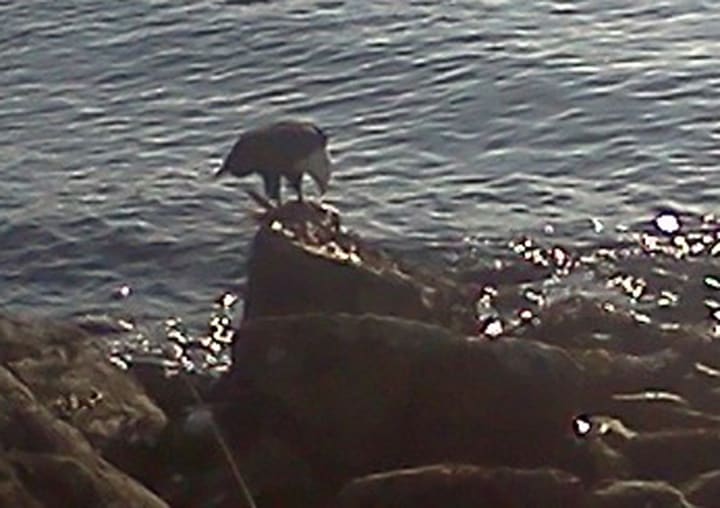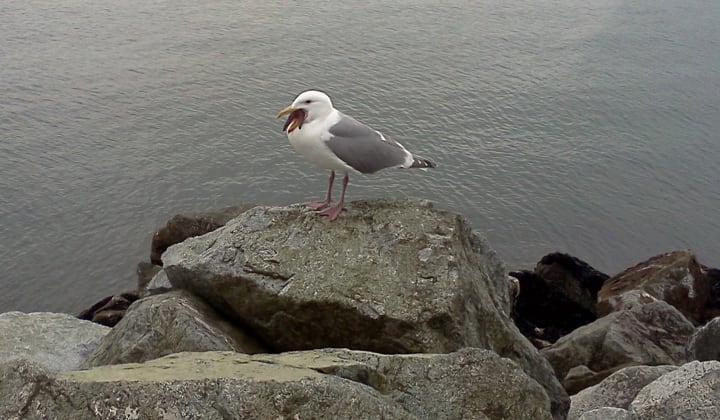
Many people, particularly mariners do not like seagulls. The reason? Superstitions. A seagull at sea it is said, carries a sailor’s soul and the screech of the bird is the mournful cry of the dead person. Do not touch the gull to avoid injury to the deceased person is another mariners superstition.
A more practical reason that gulls are looked upon with disdain is that seagulls have a habit of pecking the eyes from drowned people, floating on the surface. Of course, seagulls are not malevolent beings and make no distinction between a dead floating human carcass and a floating whale or seal carcass.
Gulls of every variety are scavengers and do a great job of cleaning up both dead sea life and scraps of food left behind by wasteful humans. The most dominant gull where I live in coastal Vancouver, British Columbia is the Glaucous Gull. They are a big bird but not as big as the Bald Eagle who regard gulls as prime food when fish are in short supply.

I have seen a Bald Eagle snatch a gull from the water, land on a nearby rock and begin devouring it.

This predation incurs the wrath of gulls who will dive-bomb eagles in an attempt to drive them away. The gulls are often joined by crows who are also victims of eagles when the opportunity arises.
Gulls are opportunists. They do not work too hard at finding food. Set out your picnic feast on the beach and within a few minutes, you will have a number of unwanted guests watching very closely for stray scraps. Leave your picnic unattended and you can expect to come back to an untidy mess created by seagulls and often helped along by crows. I have seen a seagull swoop down and grab a packet of french fries out of the hand of an unsuspecting park visitor.
A favorite food of gulls is starfish. The first time I saw a gull pecking at a starfish at low tide, I wondered how it would deal with it. Anyone who has picked up a starfish will know they have the texture of very coarse sandpaper. So how does a gull consume a starfish? The answer is, "very slowly". Occasionally they will break the starfish apart, but gulls often swallow the starfish whole. How do they do this? Whenever the starfish moves slightly, it is pushed a little bit further down the gull's gullet.

As this happens, the starfish is unable to spread out again. It appears the gull's patience and persistence is the key. A researcher studied this particular example and found that gulls can extract a great deal of the calories they need from a starfish, so even though it takes a long time to eat them, it's worth it for the gull. I should mention that gulls appear to be quite lazy birds when compared to the crow, another scavenger. Seagulls just hang around on the beach each day while crows are constantly at work, especially at low tide where they are ardent copiers of the hunting habits of gulls.
Our local beach has a children's playground that includes a mocked-up pirate ship. The mast has mast spreaders and on the top spreader, there are three wooden seagulls.

From a distance, they look like the real thing but up close it easy to see they are not. And, they obviously do not fool the local gull population as there are often one or two gulls perched next to them or on them.
Personally, I like gulls. Though not as family-oriented as crows, they take care of their young until they can fly and some for a while after that. When the tide is out, seagulls can be seen wrestling mussels and oysters off the rocks or clams from the sand. Once they have secured their prey, the gull looks for a hard surface to drop the shellfish onto, to get at the contents. Unfortunately, on a hot summer's day when the parking lots are full, some cars end up with dings and dents from high-dropped shellfish as the gulls are not too choosy on which hard surface they drop their chosen catch on.
Gulls, like ducks, swans and geese are fortunate in having three modes of transport. They swim or paddle, they can fly and they walk. Though very adept at each one, they are particularly good flyers. My wife and I live on the top floor of our building, just across the road from the sea-front walk. When sitting on our balcony we often have seagulls drifting by, floating effortlessly between the buildings, riding the breezes that swirl in from the ocean. When the wind picks up, it is fascinating to watch the gulls ride the air currents, often motionless before dipping or drifting upwards. Their landings are poetry in motion, even the youngsters not far out of the nest have their parents flying and graceful landing ability.

Seagulls are a very integral part of our ocean systems and though considered pesky by some people, our oceans and beaches would be very much poorer without their presence. Though an ocean bird, seagulls are voracious insect eaters and can often be seen in farmers' fields (and of course around landfills). The fact that they consume insects helps keep the insect population in check. Seagulls are a natural pest control for farmers and gardeners according to Living Alongside Wildlife. If at the beach, relax and enjoy this free-living, graceful bird.

If you have any comments, disagreements, or additional information on this post, please contact me through my website.
Follow me on TWITTER, FACEBOOK & LINKEDIN through my website.
My direct email is [email protected]
About the Creator
Michael Trigg
I love writing and I think it shows in my posts. I also enjoy feedback, particularly of the constructive kind. Some people think I am past my "best before date" but if that is true, it just means I have matured.






Comments
There are no comments for this story
Be the first to respond and start the conversation.